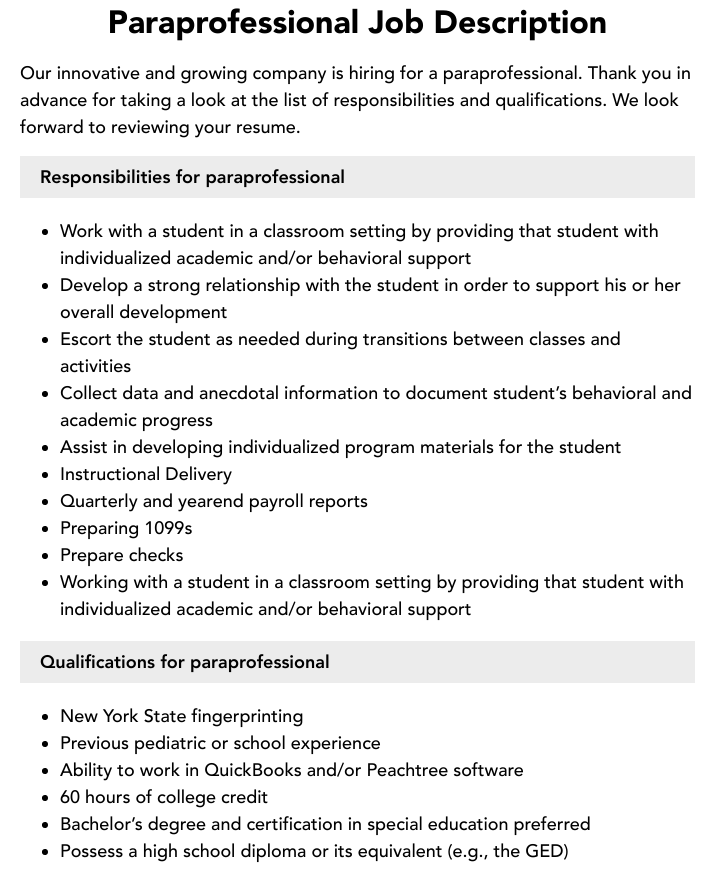
A paraprofessional is an individual who works under the supervision of a licensed professional, providing support and assistance in a variety of settings, including schools, hospitals, and social service agencies.
Paraprofessionals play a vital role in the delivery of essential services, and their work can have a significant impact on the lives of others. They are often responsible for providing direct care to clients, assisting with administrative tasks, and implementing programs and interventions.
The job description of a paraprofessional will vary depending on the specific setting in which they work, but some common responsibilities include:
- Providing direct care to clients, such as helping them with activities of daily living, providing emotional support, and teaching them new skills.
- Assisting with administrative tasks, such as answering phones, scheduling appointments, and maintaining records.
- Implementing programs and interventions, such as leading group activities, providing counseling, and conducting assessments.
Paraprofessionals must have a strong commitment to helping others, and they must be able to work independently and as part of a team. They must also be able to follow instructions, maintain confidentiality, and work effectively with clients from diverse backgrounds.
1. Duties
The duties of a paraprofessional are varied and can include a wide range of tasks, depending on the specific setting in which they work. Some common duties include:
-
Providing direct care to clients
Paraprofessionals may provide direct care to clients in a variety of settings, such as schools, hospitals, or social service agencies. This care may include helping clients with activities of daily living, such as eating, bathing, and dressing, or providing emotional support and counseling. -
Assisting with administrative tasks
Paraprofessionals may also assist with administrative tasks, such as answering phones, scheduling appointments, and maintaining records. These tasks help to keep the office running smoothly and allow the licensed professional to focus on providing care to clients. -
Implementing programs and interventions
Paraprofessionals may also be responsible for implementing programs and interventions, such as leading group activities, providing counseling, and conducting assessments. These programs and interventions are designed to help clients achieve their goals and improve their quality of life.
The duties of a paraprofessional are essential to the delivery of quality care and services. Paraprofessionals play a vital role in supporting licensed professionals and helping clients to achieve their goals.
2. Skills
Paraprofessionals work in a variety of settings, including schools, hospitals, and social service agencies. They provide support and assistance to licensed professionals and play a vital role in the delivery of essential services. The skills that paraprofessionals must have are directly related to the job description of a paraprofessional.
- Communication skills: Paraprofessionals must be able to communicate effectively with clients, families, and other professionals. They must be able to listen actively, understand what others are saying, and express themselves clearly.
- Interpersonal skills: Paraprofessionals must be able to build and maintain relationships with clients, families, and other professionals. They must be able to work effectively with people from diverse backgrounds and cultures.
- Problem-solving skills: Paraprofessionals must be able to identify and solve problems. They must be able to think critically and creatively to find solutions to challenges.
The skills that paraprofessionals must have are essential for the effective performance of their job duties. Paraprofessionals who have strong communication, interpersonal, and problem-solving skills are able to provide high-quality care and services to clients.
3. Education
The education required to become a paraprofessional varies depending on the specific job description and the state in which you live. However, most paraprofessionals typically have a high school diploma or equivalent, and some may have additional training or certification.
- High school diploma or equivalent: A high school diploma or equivalent is the minimum education requirement for most paraprofessional positions. This diploma demonstrates that you have the basic skills necessary to perform the job, such as reading, writing, and math.
- Additional training or certification: Some paraprofessional positions may require additional training or certification. This training may be specific to the job, such as training on how to work with a particular type of client or population. It may also be general training, such as training on how to provide first aid or CPR.
The education and training that you need to become a paraprofessional will vary depending on the specific job description and the state in which you live. However, the information provided above gives you a general overview of the education and training requirements for paraprofessionals.
4. Experience
The experience that paraprofessionals have working in a variety of settings is an important component of their job description. This experience allows them to develop the skills and knowledge necessary to provide high-quality care and services to clients. For example, paraprofessionals who have experience working in schools may be familiar with the different types of learning disabilities that students may have and the best ways to support them. Paraprofessionals who have experience working in hospitals may be familiar with the different medical conditions that patients may have and the best ways to provide care. Paraprofessionals who have experience working in social service agencies may be familiar with the different social and economic challenges that clients may face and the best ways to help them.
The experience that paraprofessionals have working in a variety of settings also allows them to develop a strong understanding of the different ethical and legal issues that can arise in their work. For example, paraprofessionals who work in schools may need to be aware of the confidentiality laws that protect student information. Paraprofessionals who work in hospitals may need to be aware of the HIPAA laws that protect patient privacy. Paraprofessionals who work in social service agencies may need to be aware of the laws that protect clients from discrimination.
The experience that paraprofessionals have working in a variety of settings is essential for their ability to provide high-quality care and services to clients. This experience allows them to develop the skills, knowledge, and understanding necessary to meet the needs of clients and to work effectively in a variety of settings.
FAQs about Job Descriptions of Paraprofessionals
This section provides answers to frequently asked questions about job descriptions of paraprofessionals. These questions address common concerns and misconceptions about the role and responsibilities of paraprofessionals.
Question 1: What is a paraprofessional?
A paraprofessional is an individual who works under the supervision of a licensed professional, providing support and assistance in a variety of settings, such as schools, hospitals, and social service agencies.
Question 2: What are the duties of a paraprofessional?
Paraprofessionals perform a variety of duties, including providing direct care to clients, assisting with administrative tasks, and implementing programs and interventions.
Question 3: What skills do paraprofessionals need?
Paraprofessionals must have strong communication, interpersonal, and problem-solving skills.
Question 4: What is the education and training required to become a paraprofessional?
Paraprofessionals typically have a high school diploma or equivalent, and some may have additional training or certification.
Question 5: What experience do paraprofessionals need?
Paraprofessionals may have experience working in a variety of settings, such as schools, hospitals, or social service agencies.
Question 6: What are the benefits of working as a paraprofessional?
Working as a paraprofessional offers a number of benefits, including the opportunity to make a difference in the lives of others, develop new skills, and gain valuable experience.
These are just a few of the most frequently asked questions about job descriptions of paraprofessionals. For more information, please refer to the other sections of this article.
Transition to the next article section: Understanding the job description of a paraprofessional is essential for anyone considering a career in this field. This section provides a comprehensive overview of the duties, skills, education, experience, and benefits associated with paraprofessional positions.
Tips for Writing a Job Description for a Paraprofessional
A well-written job description is essential for attracting qualified candidates and ensuring that they have a clear understanding of the role. Here are five tips for writing a job description for a paraprofessional:
Tip 1: Start with a strong introduction.
The introduction should provide a brief overview of the paraprofessional role and the organization. It should also state the purpose of the job and the key responsibilities.
Tip 2: Include a list of duties and responsibilities.
The duties and responsibilities section should provide a detailed list of the tasks that the paraprofessional will be expected to perform. These tasks should be specific and measurable.
Tip 3: Describe the required qualifications.
The qualifications section should list the minimum requirements for the job, such as education, experience, and skills. It should also state any preferred qualifications.
Tip 4: Include a salary range.
The salary range section should provide a clear indication of the salary that the organization is offering for the position. This information will help candidates to determine if the job is a good fit for their financial needs.
Tip 5: Proofread carefully.
Before posting the job description, it is important to proofread it carefully for any errors. This will help to ensure that the job description is clear and easy to understand.
By following these tips, you can write a job description that will attract qualified candidates and help you to find the right person for the job.
Summary of key takeaways or benefits:
- A well-written job description will help you to attract qualified candidates.
- The job description should provide a clear overview of the role and the key responsibilities.
- The job description should include a list of duties and responsibilities, the required qualifications, and the salary range.
- Proofreading the job description carefully before posting it will help to ensure that it is clear and easy to understand.
Transition to the article’s conclusion:
Writing a job description for a paraprofessional can be a challenge, but by following these tips, you can create a job description that will attract qualified candidates and help you to find the right person for the job.



